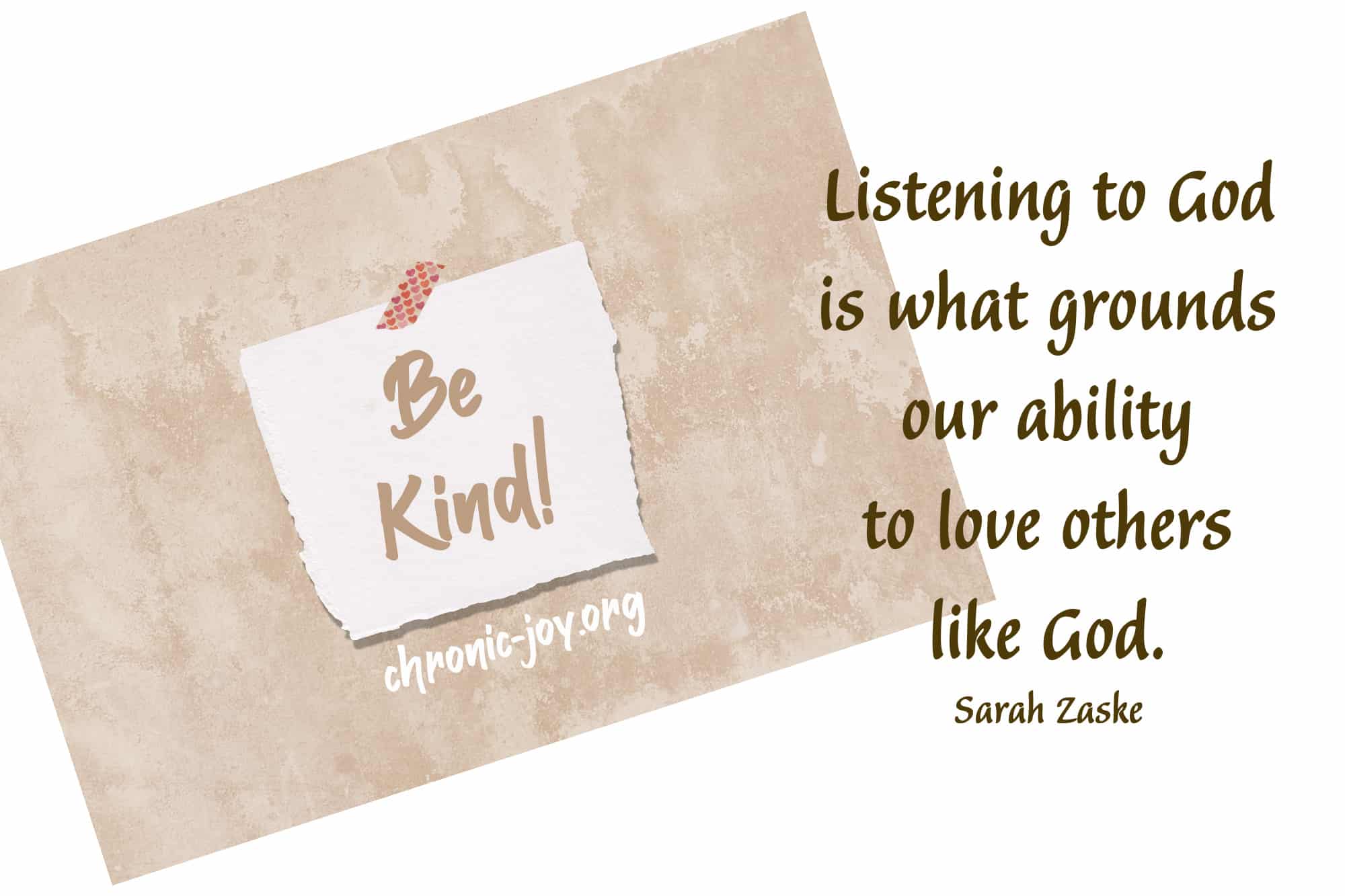
“Be kind! Listening to God is what grounds our ability to love others like God.” (Sarah Zaske)
LEARN FROM JESUS’ EXAMPLE
A typical Manhattan morning is noisy, crowded, and busy – and this day was no exception. Like the thousands of individuals with whom I shared the sidewalk, I had somewhere to be and was running late. As I hurried down Fifth Avenue, I heard a noise that stood out. It is common to hear construction, honking, or even shouting, but this was different – someone was crying, sobbing, actually. I looked toward the noise and saw a homeless woman sitting to the side, weeping, her back pressed against a building.
But I kept walking.
Then, I justified the decision. “I’m late,” I told myself, “Someone else will help her.” Despite my best efforts at self-persuasion, I made it only one block further before conviction grew too great. Returning to the woman, I began rummaging around in my purse. I hurriedly pulled some cash from my wallet, placed it in her cup, and tried to go on my way. Conviction surfaced again. I knew this was not the correct response either. God was asking something more from me.
At that moment, what I had read and remembered from the pages of Scripture surfaced, clashing with my current demands and desires.
PAUSING TO LISTEN
I paused to remember how Jesus encountered quite a few people in need while en route somewhere. How did he respond to the woman at the well or the disciples walking toward the village of Emmaus? What about blind Bartimaeus? While I wanted to hurry and leave, Jesus was eager to pause and listen.
Jesus’s command is clear: “Love one another. As I have loved you, so you must love one another” (John 13:34). While Jesus loved others well in many ways, loving through listening was often his first move – and that day I knew it should be mine.
I knelt on the pavement next to the woman, looked her in the eye, and asked her, “Why are you crying?” I wanted to know what her tears meant. I wanted her to know that her story mattered. Instead of worrying about everything I could not do for this woman, I focused on what I could do. I knew I could follow Jesus’s lead and love her through listening.
We spent time talking about the difficulties she had encountered in life and the deep loneliness she was feeling that day. After twenty minutes of sharing her heart, we prayed together. When I opened my eyes after the prayer, I was so moved by the strength of this woman that I was the one crying, and she was the one smiling. “No one ever talks to me,” she said. I knew she meant, “No one ever listens to me.” We all need to be heard.
LEARNING TO LOVE THROUGH LISTENING
Theologian David Augsburger says, “Being heard is so close to being loved that for the average person, they are almost indistinguishable.” It took a few failed attempts, but I was able to show God’s love to her that morning in the way she needed to receive it. This was only possible because I first listened to God speak to me through the pages of Scripture. Listening to others in love is only possible when you first listen to God in earnest.
Near the end of the Sermon on the Mount, Jesus said that we can either be a person who “hears these words of mine and obeys them” or “hears these words of mine and does not obey them” (Matthew 7:24, 26). Our ability to obey directly correlates with our ability to hear. Is it possible that you fail to obey simply because you fail to hear? Listening to God is what grounds our ability to love others like God.
LISTENING TO GOD THROUGH SCRIPTURE
While there are many ways in which we can hear God, Scripture is foundational. When you read the Bible, you can give space for God’s Spirit to teach, direct, encourage, convict, and move you toward action. Just as you must be tuned to a radio signal to listen to the music, you must be attuned to God’s voice through the Scriptures if you are to listen and respond. Radio stations continuously broadcast, yet they remain inaudible unless you tune to the right frequency. Similarly, God always speaks but will usually remain unheard unless we intentionally listen.
Are you simply reading the Bible, or are you listening for God to speak to you through your Bible reading? Is your aim to get through the text or allow the text to get through you? Are you gaining more information without a changed heart and redirected actions? If so, it may be time to listen more carefully.
LISTENING AND RESPONDING
One clue that you are listening is that you are responding. Listening always requires a response from us. Obedience is not separate from listening but a step toward listening’s completion. In fact, the word obedience stems from the Latin ob + audire, which means “to” + “listen.” To obey literally means to listen! James states this truth: “Obey God’s message! Don’t fool yourself by just listening to it” (James 1:22). Proper listening always leads to action.
What would happen?
How different would our families, friendships, churches, neighborhoods, and cities look if we followed through on the task of listening well? Lean into listening to the voice of God, knowing that ultimately, it will cause you to lean into loving those God places in your path.
Listening as a Way of Loving Others Like Jesus: Learn From Jesus’ Example first published at American Bible Society on August 13, 2018. Published with permission.
Questions for Reflection
1. As you read your Bible, consider this thought experiment from pastor and chaplain Peter Marshall: “I wonder what would happen if we all agreed to read one of the Gospels until we came to a place that told us to do something, then went out to do it, and only after we had done it … began reading again?”
2. What would happen? How different would our families, friendships, churches, neighborhoods, and cities look if we followed through on the task of listening well? Lean into listening to the voice of God, knowing that ultimately, it will cause you to lean into loving those God places in your path.
3. How can you sacrifice time this week to generously love another?


Sarah Zaske
Pastor
Sarah is a pastor, leader, and speaker who is passionate about encouraging the church and equipping its leaders so that the world can encounter Jesus in a personal way. Holding a master’s degree in mental health counseling, Sarah understands the integration of emotional and spiritual health and regularly incorporates this into her teaching and leadership. She currently serves as a pastor at Hope Chapel, located throughout the Kansas City Metro area, and leads Kindreds – a ministry that exists to create spaces of belonging for women to behold God, be loved by others, and believe that they can be a hope-bringer to the world. Sarah is married to her high school sweetheart, Jake, and is the mother of two of the best kids around. You can get to know her better by visiting sarahzaske.com or connecting with her on Instagram or Twitter @sarahzaske.

Creative Ways to Serve
Chronic illness can make serving in traditional or culturally familiar ways challenging – but not impossible. Discover creative new ways to love God and others right where you are, however you are able.

Recent Comments